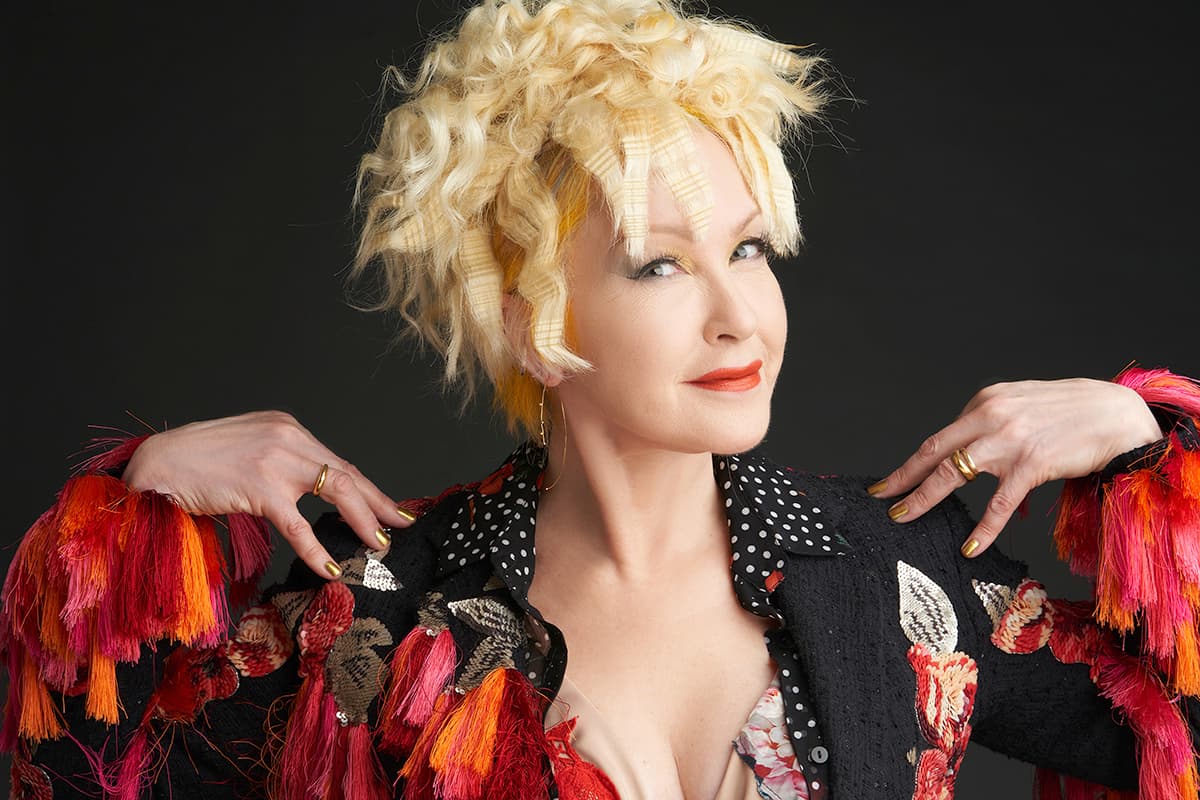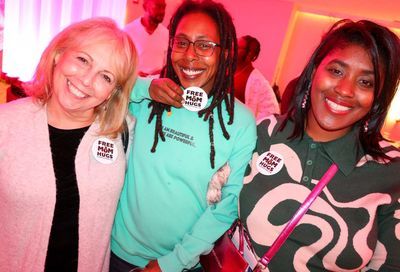The Peters Principle: Bernadette Peters
Broadway legend. TV star. LGBTQ rights supporter. Animal activist. Bernadette Peters has always lived by her own code of passion and compassion.
By Doug Rule on June 1, 2017 @ruleonwriting

“Hang on one second, can you? I’m expecting my singing lesson,” says Bernadette Peters in the midst of a phone interview.
Let’s be clear, however. Peters isn’t giving the lesson. No ingenue is walking in to learn from the three-time Tony-winning Broadway legend. “I am the student,” she says, after letting in her vocal coach. “I still take singing lessons “I’m always checking my voice… It’s like any muscle — you have to exercise.”
It’s why her pliable, brassy voice remains fully intact and better than ever after five decades in show business. The preternaturally young, auburn-locked 69-year-old has been a prodigious and acclaimed sensation since her first Tony nomination, when she appeared in the 1971 revival of Leonard Bernstein’s On The Town. Peters cemented her leading lady status in both new works (Into The Woods, The Goodbye Girl) and reimagined revivals (Annie Get Your Gun, Gypsy). She’s widely considered the foremost interpreter of Stephen Sondheim’s work.
She had a brief run in film — opposite Steve Martin in Carl Reiner’s outlandishly funny comedy, The Jerk (1979) and Herbert Ross’s ravishing Pennies from Heaven (1981), not to mention John Huston’s regrettable movie version of Annie (1982) — but in recent years, her primary acting work has come through television, from NBC’s Smash, where she portrayed a retired Broadway star to Amazon’s hit Mozart in the Jungle and, most recently, The Good Fight, the razor-sharp spinoff to the long-running CBS series The Good Wife, starring fellow Broadway legend Christine Baranski.
Barely a teenager when she got her start in the business, Peters surrounded herself with show people, including the dancers in a touring production of Gypsy, many of whom were openly gay. “I wasn’t living in…a place where people were afraid to come out,” she says. “I was in a world where people were who they were.”
To her credit, Peters has long been an advocate for LGBTQ rights and the fight against HIV/AIDS, including performing numerous benefit concerts for New York’s GMHC. Her advocacy for the cause, including decades of service as a trustee on the board of Broadway Cares/Equity Fights AIDS, has ultimately led her to pursue what has become her greatest passion. In 1999, she launched Broadway Barks with the late Mary Tyler Moore, an annual event that benefits New York animal shelters and adoption agencies, and is produced by Broadway Cares. “We love the little doggies, let us help you,” Peters recalls Tom Viola, head of the Broadway Cares, telling her and Moore.
A month before this year’s Broadway Barks, Peters returns to the area for her first appearance since a starring turn in the Kennedy Center-produced, Tony-nominated revival of Follies in 2011. The occasion is a Saturday night concert at Wolf Trap, featuring musical direction from her friend and accompanist Marvin Laird.
It’s not her first time at Wolf Trap. In 1987, she was part of a PBS Great Performances tribute to Broadway songwriting legends Alan and Marilyn Bergman.
“Tony Bennett was there!” she exclaims. “I went, ‘God, I’m on the same bill as Tony Bennett.’ I was so impressed.”
METRO WEEKLY: You’re at Wolf Trap this weekend. What do you enjoy most about performing concerts like this?
BERNADETTE PETERS: There’s no fourth wall. We’re all together in this environment. And I know, basically, my job is to entertain. And that could be done in so many different ways — in a dramatic way, in a funny way.
At Wolf Trap, we’re outside. It’s going to be exciting. Might be hot. But I’m so happy to come and sing at Wolf Trap. I’ll be doing songs from Follies. I’ll be doing songs from A Little Night Music. There’s lots of stuff since 2006 that I’ve added in.
MW: Do you ever grow bored singing the same songs?
PETERS: No, because I choose very carefully. [Laughs.] I choose songs that I like to be reminded of, the sentiments. Like “No One Is Alone,” “Children Will Listen” and “With So Little To Be Sure Of.” I pick songs that I like to sing and that I really think are wonderful songs to hear. It’s hard to put a new one in, because it really has to fit the arc, and it has to be worthwhile.
I know that if I connect to the song, the audience will connect to the song. Years ago, people would say, “You just can’t go out there and keep doing Sondheim because, middle America [won’t go for it]…” Not true! Not true at all. Because what he’s saying is very true to humanity. And that’s what I’m singing about. Things that we all feel, things we all go through, as long as I connect to it.
MW: One of your best-known roles was Mama Rose in the 2003 revival of Gypsy. What did that show mean to you?
PETERS: Oh, Gypsy. I love that show! I love it. I love the character. It was the best analysis of myself, just doing that. It was so interesting, it was so great. I had such a great cast.
MW: And the connection runs deeper, as Gypsy was also one of your first shows. You were in the second national touring production in 1961.
PETERS: I understudied Dainty June, and my sister understudied Louise, and my mother was Lizza. So it was like re-enacting the whole thing.
MW: Was your mother at all like Rose?
PETERS: Well, I always said to her, “I could leave show business whenever I wanted, right?” She would always say, “It’s up to you,” which was kind of smart. But she wanted the best for her kids. Just growing up in Queens was a pretty bland life. I’m grateful for her for introducing me to this world and this creativity.
She had wanted to be an actress, but her mother wouldn’t let her, because she was from the old country, from Italy. In those days, that meant you were a whore if you were an actress. But my mother said, “I sang in front of the television.” And my sister, who was older, she went to the High School of Performing Arts, so everything was set in motion.

MW: Could you have imagined any other career for yourself?
PETERS: No. I took a test once and I have no aptitude for anything except hygiene. I don’t mean a dental hygienist, it was something about hygiene. [Laughs.]
MW: Given your Broadway career, do you remember when you first became aware of gay people?
PETERS: When I was on the road with Gypsy. I was 13 and I just understood that some of the dancers were gay. I mean, they didn’t come up to me at 13 years old and say, “Well, I’m gay.” It was just part of my ambience. I wasn’t living in a society or a world or a place where people were afraid to come out. I was in a world where people were who they were.
Talking about coming out: A dear, dear friend of mine had to come let me know that he had HIV. He wanted to let me know because we were so close. I said, “Well, let’s just deal with it.” And that’s what I did.
MW: When you were 13, the idea of two men getting married must have been unthinkable =- even for your gay friends.
PETERS: I know! And [marriage is] wonderful. I think it’s healthy to commit to somebody and say, “This is my life, and this is who I love, and we have a life together.” And it’s so important for young people who feel that they’re gay to realize they can have a lovely, loving family. And not to feel like something is wrong with them, to feel like they don’t have to hide anything. And I think even parents are coming around too, more and more. Not everybody, but more and more. That’s all good.
I was for same-sex marriage right from the beginning. It took me a while to grasp “my husband/my wife,” but those are just words, you know? It just makes me so happy to hear. I was talking to some fellow in the airport and he was just chatting. I saw a wedding band on him, and he said, “My husband.” It just sounded so wonderful to hear him say that. It’s great. It’s just great.
MW: How do you feel about the state of theater today?
PETERS: It seems to be flourishing. All the theaters seem to be full. And that is a thrill. Anything that interests people I think is good, because then you get an audience that goes, “Hey! I love going to the theater. I love going to musicals. I love going to plays.” And then that creates more people going to the theater.
MW: Is there a current show you particularly like?
PETERS: I think A Doll’s House, Part 2 is great. The performances are great. I have to catch up some more, actually, on seeing things.
MW: You’ve been spending more time working on television lately, such as starring as orchestra board chair Gloria in Amazon’s Mozart in the Jungle. How are you finding it?
PETERS: I love it. I love the cast. We get along great. I love that the writing is creative, artistic. I love Gael Garcia Bernal and Malcolm McDowell — they’re very original, both of them. I think that Gael created this really terrific character. And Lola Kirke. I mean, everyone’s fabulous in it. And it’s not a dark, dark, dark show. So I like that about it, too.
And we travel with it. We were doing opera, and we were in Venice last year. I’m now getting ready for [another season]. I’m anxious to see what happens this year.
MW: I just started watching The Good Fight, but I’ve been blown away by the first three episodes.
PETERS: The writing is amazing. And it’s very relevant. We talk about hacking, we talk about characters like the alt-right — the [gay] Milo [Yiannopoulos] guy. It’s really, really good. And I play a Bernie Madoff-type wife. So my poor daughter’s trying to figure out who’s lying to her, because she’s in the law firm with Christine. It’s very, very good, I have to say.
MW: You’re playing against type, with a “bad guy” character. Is that a welcome challenge for you?
PETERS: It is! That was it, it was a great challenge. Of course I said, “Now don’t tell me who the villain is here, or who’s the guilty party.” And they said, “No, we won’t.” So every week, when I would get my script, it was up for grabs. It was very interesting.
MW: At Wolf Trap this weekend, will you perform “Kramer’s Song,” which you wrote and included with your 2008 children’s book Broadway Barks?
PETERS: Yes. Since my passion is helping animals in shelters. We’re going to have our Broadway Barks event on July 8th this year. So right now, I’m making phone calls, raising money. That’s my job right now.
MW: What led to animals becoming your most passionate advocacy project?
PETERS: I’ve always loved animals. I begged and begged and begged my mother to get a dog. And finally when I was nine, she got me a dog from Bideawee [New York shelter]. She was a little Duck Tolling Retriever, kind of like a little Golden Retriever.
In those days we didn’t know the importance of spaying and neutering. She had a couple of litters. And I went out and I interviewed all the people before I let them have a puppy. I was crazed, you know, about these puppies. “They have to get good homes.” My father, I have to say, was a great animal lover. He’d bring in injured birds. It’s just in you, that love for animals. My heart goes out to these animals in shelters, and the euthanasia that’s so unnecessary — they really do communicate with us if you give them half a chance. We’ve learned that dogs have a 500-word vocabulary. They understand a lot.
MW: Are you a cat person, as well?
PETERS: I love cats. I’m actually allergic, but I have a long-haired cat, and the long-hair holds the dander down. My pit bull loves the cat. They get along great. But I’m even allergic to some dogs — if they have a skin problem and they’re itching and their dander is flying, then I’m allergic to them.
MW: How many dogs do you have?
PETERS: Two. I always say, one for each hand. Rosalia the pit bull and Charlie the shaggy mutt.
MW: Do they get along?
PETERS: Oh my God, Charlie kisses me in the morning and then he kisses her. He loves her.
MW: Since starting Broadway Barks, have you noticed people getting better at caring for their pets?
PETERS: Yeah, we have, actually. A lot of people are now getting rescue dogs — dogs from shelters — where at first they thought there was something wrong with them. But there’s nothing wrong with them, it’s just that people get allergic, people lose their homes, people move, whatever. But there are very adoptable, beautiful animals in the shelter. And by the way, Washington D.C. has a great Humane Society. They do great work with shelter animals.
MW: A lot of rescue dogs are pit bulls, which is still problematic for a lot of people.
PETERS: Yeah, there’s a stigma attached to them. What happens is these bad guys, they have the dog of the moment. Years ago, it was German Shepherds, they would get them to be aggressive. And then there was the Dobermans. And now it’s pit bulls. They’ve been really victimized, actually, because they’ll do anything for you. And they try to get them to fight: they put cigarette butts out on them, they feed them gunpowder, they abuse them, make them angry. And some dogs, no matter what’s done to them, they just come back for love. But [pit bulls] were the nanny dog of the turn of the century. Our Gang‘s Petey, with the circle around his eye, that was a pit bull, because that was the family dog at the time. All of Michael Vick’s [pit bulls], except for two, were rehabilitated and became reading dogs. When kids have a problem communicating with people, they’ll read to a dog, and it helps them get over their communication problems.
MW: What do you do to make sure your dogs are well cared for?
PETERS: I give them a lot of respect and understanding and trust. And make them feel secure. When you make them feel secure, they trust you. A lot of love. They’re very happy. I actually had to go to the vet, and I brought both of them. And the vet went, “Gosh, they’re so happy!”
MW: It makes you wish that they lived as long as we do.
PETERS: It’s horrible, but then they teach that you can love again, I guess. After I had my last two, I thought, “That’s it. I’ll never love a dog like this again.” But what happened was, when my first one, Kramer, died, my second one, Stella, was grieving over him so badly, I had to get her a dog before I was even ready to get a dog.
She would take his mat and push it up against the front door and sleep there, waiting for him to come home. And then at five in the morning one morning, I hear her crying, looking at his bed. And you know, he was here first and she came as a puppy, and there was always a dog here for her. So I said, “Well, alright, I gotta go find a dog for you.” So I did. I found Charlie. And then she was content again. He’d lie on the sofa and she’d put her head on his butt and she had this contented look on her face.
MW: I had a Schipperke-Chihuahua mix I rescued from the shelter, but I had to put him down two years ago due to health problems associated with a failing heart.
PETERS: Oh, that’s so sad, isn’t it? And that’s too bad because Schipperkes, usually, they’re the longest-living dogs.
MW: What would you say to somebody, like me, who lost their dog and aren’t sure they’re ready for another?
PETERS: You’re avoiding love. You’re losing out on the good part. When I got Charlie, I said, “Well, you’re pretty cute, but you’re not Kramer.” And then I go, “Well, you’re pretty smart, too.” And then finally they just win you over. I hope you consider getting another dog, because they are wonderful beings and they are healing to have. But I know it’s hard. The only reason I got another one was because Stella needed one. So, maybe you should get two?
Bernadette Peters performs Saturday, June 3, at 8 p.m., at the Filene Center at Wolf Trap, 1551 Trap Road, Vienna. Tickets are $25 to $75. Call 877-WOLFTRAP or visit wolftrap.org.
Peters will also be the focus of a “Profiles in Creativity with David Rubenstein” discussion on Monday, June 26, at 7:30 p.m., at the Kennedy Center Family Theater. Tickets are $30. Call 202-467-4600 or visit kennedy-center.org.
Matthew Broderick Was Part of Gay History with Torch Song Trilogy
From the original "Torch Song Trilogy" to "Election," to his current role in "Babbitt," the actor reflects on his legendary career.
By Randy Shulman on October 13, 2024 @RandyShulman
READ THIS INTERVIEW IN THE MAGAZINE
"Are those dials?"
Matthew Broderick hovers over a camera on a recent sunny morning at The Shakespeare Theatre's Harman Hall, where he's being photographed for a Metro Weekly cover. As the photographer shows off his preference for old-school camera bodies with physical dials, as opposed to digital interfaces, a casually dressed Broderick listens intently. The magazine's publisher and the theater's publicist, meanwhile, stand to the side, each nervously counting down the minutes left as the clock rapidly runs out on the 20-minute shoot.
Cyndi Lauper is Still Having Fun
Pop legend and LGBTQ advocate Cyndi Lauper launches into a national multi-city farewell tour that combines art and music.
By Doug Rule on October 20, 2024 @ruleonwriting
"As a kid, I heard a lot of sad stories about women."
Those words appear early in Cyndi Lauper: A Memoir, which the pop superstar released in 2017. As she tells it, Lauper was especially distraught hearing stories in which her grandmother, her mother, and her aunt were each dissuaded or denied chances to pursue their individual dreams or opportunities -- and all solely because of their gender. "I could never undo the wrong done...because of a ridiculous mentality that kept women back," she wrote.
What she could do was to commit herself to changing that narrative, and to not let similar limits get in her way, particularly when it came to pursuing a career in music. Her drive was at least in part motivated by her mother, the Brooklyn-reared daughter of Catholic immigrants from Sicily.
Support Metro Weekly’s Journalism
These are challenging times for news organizations. And yet it’s crucial we stay active and provide vital resources and information to both our local readers and the world. So won’t you please take a moment and consider supporting Metro Weekly with a membership? For as little as $5 a month, you can help ensure Metro Weekly magazine and MetroWeekly.com remain free, viable resources as we provide the best, most diverse, culturally-resonant LGBTQ coverage in both the D.C. region and around the world. Memberships come with exclusive perks and discounts, your own personal digital delivery of each week’s magazine (and an archive), access to our Member's Lounge when it launches this fall, and exclusive members-only items like Metro Weekly Membership Mugs and Tote Bags! Check out all our membership levels here and please join us today!
The Magazine
-
Most Popular
 Sarah McBride Criticized for Complying with Restroom Ban
Sarah McBride Criticized for Complying with Restroom Ban  Man Sentenced to Life for Murder of Gay Jewish Student
Man Sentenced to Life for Murder of Gay Jewish Student  Gay Adult Film Star Blasted for Hailing Trump's Victory
Gay Adult Film Star Blasted for Hailing Trump's Victory  Trump Taps Anti-LGBTQ Matt Gaetz for Attorney General
Trump Taps Anti-LGBTQ Matt Gaetz for Attorney General  A Grim Report Details Anti-Trans Violence in America
A Grim Report Details Anti-Trans Violence in America  Kierra Johnson: To Fight Trump, We Must “Lean Into Community”
Kierra Johnson: To Fight Trump, We Must “Lean Into Community”  John Leguizamo's America
John Leguizamo's America  Same-Sex Kiss Cut from 'Gladiator II'
Same-Sex Kiss Cut from 'Gladiator II'  Speaker Mike Johnson Imposes a Trans Restroom Ban
Speaker Mike Johnson Imposes a Trans Restroom Ban  'Maybe Happy Ending': Love Among the Machines
'Maybe Happy Ending': Love Among the Machines
 Sarah McBride Criticized for Complying with Restroom Ban
Sarah McBride Criticized for Complying with Restroom Ban  Man Sentenced to Life for Murder of Gay Jewish Student
Man Sentenced to Life for Murder of Gay Jewish Student  Speaker Mike Johnson Imposes a Trans Restroom Ban
Speaker Mike Johnson Imposes a Trans Restroom Ban  Gay People Targeted with 'Re-Education Camp' Texts
Gay People Targeted with 'Re-Education Camp' Texts  A Grim Report Details Anti-Trans Violence in America
A Grim Report Details Anti-Trans Violence in America  Nancy Mace Wants to Ban Sarah McBride from Capitol Restrooms
Nancy Mace Wants to Ban Sarah McBride from Capitol Restrooms  Staten Island St. Patrick's Day Parade to Allow LGBTQ Groups
Staten Island St. Patrick's Day Parade to Allow LGBTQ Groups  LaMelo Ball Fined $100,000 by NBA for Anti-Gay Slur
LaMelo Ball Fined $100,000 by NBA for Anti-Gay Slur  Rodrigo Heng-Lehtinen on “The New Chapter of Our Resistance”
Rodrigo Heng-Lehtinen on “The New Chapter of Our Resistance”  Same-Sex Kiss Cut from 'Gladiator II'
Same-Sex Kiss Cut from 'Gladiator II'
Scene
Metro Weekly
Washington's LGBTQ Magazine
P.O. Box 11559
Washington, DC 20008 (202) 638-6830
About Us pageFollow Us:
· Facebook
· Twitter
· Flipboard
· YouTube
· Instagram
· RSS News | RSS SceneArchives
Copyright ©2024 Jansi LLC.









You must be logged in to post a comment.